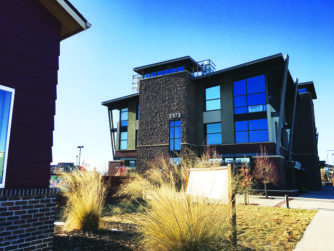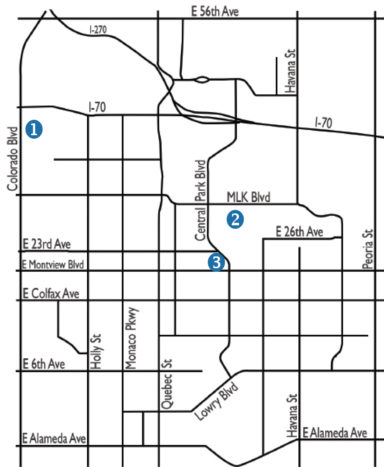1.) Park Hill Golf Course to Close in 2019
The big question is whether that closure will be permanent. The planned closure next January results from a Denver City Council decision in December to proceed with acquisition of permanent and temporary easements totaling up to 90 acres of the 155-acre site. That acreage will be for storm drainage improvements that are part of the city’s controversial Platte-to-Park-Hill project. Construction of a 25-to-35-acre permanent drainage area will be followed by restoration, with a planned re-opening of the golf course in March 2020. Maybe. That depends on whether the golf course operator, Arcis, decides to exercise its option to extend the lease it has with the property owner, Clayton Early Learning Trust.
The Arcis lease is set to expire at the end of this year. The city and Clayton had announced in September the land would be sold to the city based on Clayton’s understanding that Arcis would not exercise its lease extension option. Clayton had decided to sell the land because the sale would provide it more revenue than the golf course operation. Clayton and Arcis discussions on the future of the golf course continue, suspending Clayton’s heavily advertised community planning process about possible future uses of the large site.
Denver Public Works spokesperson Nancy Kuhn says, “Given the facts we know today, Denver is preparing to pay for restoration of the golf course but we think it is likely Clayton will contract for that work to be done.” Denver has set aside $10.7 million in the Real Estate Division’s budget for acquisition of permanent and temporary construction easements and golf course restoration and damages resulting from the drainage detention project. No drawings are available from the city that illustrate where the construction will take place, but the site’s topography suggests the permanent drainage pond will be on the north side of the course adjacent to Smith Rd. The Park Hill Golf Course closure comes on the heels of two other golf course closures in northeast Denver: the permanent closure in December of the Fitzsimons golf course and the temporary closure of City Park Golf Course at the end of October 2017 for a complete make-over and construction of drainage detention integrated into the golf course and construction of a new club house. That golf course is slated to re-open in mid-2019.
2.) RTD Terminates Bus Route 89
On Jan. 15, RTD terminated the Route 89 bus service linking the Central Park Blvd. station to the Anschutz Medical Campus. It has been replaced in part by an extension of the existing Route 34 bus from CPB station to Eastbridge (the buses turn around where the MLK Blvd./29th Dr. couplet intersects Havana and Iola streets).
Jeff Dunning, RTD’s senior service planner/scheduler, said the change was necessitated by the 89’s low ridership that was “way below our standards.” The 89 had an average of eight passengers per hour. Dunning said such an urban route requires a minimum of 20 boardings per hour to be financially sustainable for the regional district. The service began operation in January 2013. Jesse Livingston, with Northeast Transportation Connections, said his organization worked with RTD to extend the Route 34 service to Eastbridge to “offset the discontinuance of Route 89, maintaining service to the Mercy Housing development and access to grocers and the greater transit network.”
Route 34 historically has run from the Central Park Station to 30th and Downing through North Park Hill along Smith Road and 35th Ave.
The 89 was an hourly, weekday-only service. The 34 runs every 30 minutes through most of the day, and at one-hour intervals during off-peak hours. On Sundays, the Route 34 buses run on-the-hour. However, the CPB to MLK Blvd.-Havana St. extension does not run on weekends and runs a more limited schedule, roughly from 6:30 in the morning until 6:30 in the evening. Between 6:30 and 8:30am, buses depart MLK Blvd.-Havana on the half-hour.
Dunning said that RTD will reevaluate the local bus service routing after the MLK extension is finished to Peoria St. Improved roadway connectivity between Stapleton and the Anschutz Campus may warrant additional adjustments to RTD’s bus service network. RTD’s Route 62, connecting CPB station to the Commerce City Civic Center and points west, is in the first year of a three-year trial service funded through a federal grant augmented by a local match provided by Commerce City. That service began in January 2017.
3.) Small Cell Installation Permitted
A Front Porch reader inquired about city rules pertaining to installation of small cell infrastructure on private buildings in proximity to schools. The question was prompted by observing an installation on a building at 2373 Central Park Blvd. (southwest corner of Verbena St. and CPB, adjacent to the Montessori Children’s House of Denver. (See photo below) The antennae have subsequently been hidden by panels mimicking the appearance of a masonry wall.

Small cell infrastructure was recently erected atop this building at 2373 Central Park Boulevard, adjacent to Montessori Children’s House of Denver.
Andrea Burns, communications director for Denver’s Department of Community Planning and Development provided this statement: “There are no separation requirements for small cells (which is the term used by the industry for antennas not attached to a tower) and schools. Separation requirements do apply to new telecommunications towers. Small cells do not require any notification to the public and are administratively reviewed by our zoning permitting staff. The city’s current regulatory approach enables the placement of antennas and their associated equipment on buildings as a means to discourage the construction of new telecommunications towers.”
Denver Makes First Cut in Amazon HQ2 Sweepstakes
Amazon announced Jan. 18 that Denver is among 20 finalists in the competition to land a second corporate headquarters for the online behemoth. Denver joins L.A., Austin and Dallas as the only western U.S. cities to survive the first cut from the 238 initial submittals. The balance of Denver’s competition is comprised of cities located between Chicago and the East Coast. Toronto is the only place outside of the U.S. being considered.
Amazon announced its competition on Sept. 7. Colorado submitted its application by the Oct. 19 deadline. It was a single bid with eight alternative sites. All are in the Denver-metro area due to Amazon’s initial selection criteria: location within a 45-minute drive of an international airport, no more than two miles from a major highway, access to mass transit and location within a 30-minute drive of a population center of 1 million or more people. Forest City submitted two sites in Stapleton but the state has not revealed whether those are among the eight sites included in the Colorado application.
In a press release, Amazon stated it expects to make a decision in 2018: “In the coming months, Amazon will work with each of the candidate locations to dive deeper into their proposals, request additional information, and evaluate the feasibility of a future partnership that can accommodate the company’s hiring plans as well as benefit its employees and the local community.” Colorado’s bid offered potential financial incentives that could exceed $100 million with many locales offering far higher amounts in incentives ranging from tax credits and abatements to grants and infrastructure contributions.
The Amazon HQ2 project is of enormous scale: 50,000 employees at build-out with average salaries of $100,000 in a phase one building of at least 500,000 square feet and a complex at build-out in the 8 million-square-foot range on 100 acres with a total investment of $5 billion.
Colorado’s response to the Amazon request for proposals (RFP) is being coordinated by the Office of Economic Development and International Trade (OEDIT) with initial vetting of sites run through the Metro Economic Development Corporation (Metro EDC).
MY Denver PRIME Gets Seniors Free Access to Rec Centers
Denver now provides seniors (ages 60 and up) free access to its recreation centers and pools, including drop-in fitness classes and clubs, through the MY Denver PRIME program, similar to the MY Denver card available to city youth. Simply bring proof of Denver residency and a photo ID that verifies your age to front desk staff at any Denver Recreation Center. In NE Denver, those facilities include the Central Park Recreation Center (9651 E. MLK Blvd.), the Hiawatha Davis Center (3334 Holly St.), the MLK Rec Center (3880 Newport St.), and the Montclair Recreation Center (729 Ulster Way). The pass can also be used at the recently opened Carla Madison Recreation Center (2401 E. Colfax Ave., northeast corner of Colfax and Josephine St.).
This membership is for recreation centers and pools and does not offer admission discounts to Denver’s cultural institutions such as museums and the zoo. The program is also not available to those already eligible for another discount program such as Silver Sneakers or the Denver Health Medical Plan, Medicare Choice or Medicare Select.
No one younger than 60 years is eligible for MY Denver PRIME. MY Denver PRIME is only available to those who do not have a current recreation center membership. Current memberships cannot be refunded or pro-rated. If you already have a membership, please wait until it expires to enroll in MY Denver PRIME. Additional information is available at DenverGov.org > search for My Denver Prime.




0 Comments